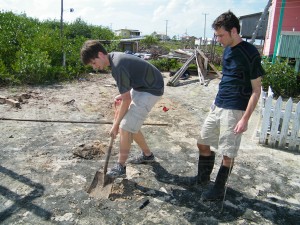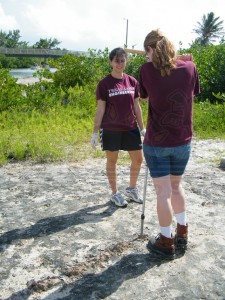 A group from “Engineers without Borders” is in San Pedro Town conducting two major researches in the San Mateo area. The group of nine, which arrived on Friday, January 4th, includes Civil Professional Engineer, Jon Fripp, who is conducting soil tests and health assessments in different areas of the San Mateo community. The volunteers include a nursing student from Stephen F. Austin State University (SFA) and seven engineering students from Texas Agricultural and Mechanical University (Texas AM or TAMU).
A group from “Engineers without Borders” is in San Pedro Town conducting two major researches in the San Mateo area. The group of nine, which arrived on Friday, January 4th, includes Civil Professional Engineer, Jon Fripp, who is conducting soil tests and health assessments in different areas of the San Mateo community. The volunteers include a nursing student from Stephen F. Austin State University (SFA) and seven engineering students from Texas Agricultural and Mechanical University (Texas AM or TAMU).
 Leader of the group Jon Fripp explained to The San Pedro Sun that two levels of projects will be conducted by the students during their stay in San Mateo. The first project is a health and mapping assessment. “We will be using Global Positioning Systems (GPS) and mapping technology. We are trying to get a more accurate assessment of the community; where the roads are and where the houses are and this will be digitized. We will provide it to the community and to the local entities to better plan the distribution of health related things such as the water filters and any type of ongoing planning. We are coordinating that; with the data we are collecting from the health assessment,” explained Fripp.
Leader of the group Jon Fripp explained to The San Pedro Sun that two levels of projects will be conducted by the students during their stay in San Mateo. The first project is a health and mapping assessment. “We will be using Global Positioning Systems (GPS) and mapping technology. We are trying to get a more accurate assessment of the community; where the roads are and where the houses are and this will be digitized. We will provide it to the community and to the local entities to better plan the distribution of health related things such as the water filters and any type of ongoing planning. We are coordinating that; with the data we are collecting from the health assessment,” explained Fripp.
According to Fripp the health assessment will focus on three things. The first includes the physical health assessment of the people in the house which would look to see if there are any particular baseline conditions. The second is an assessment of the water that the residents are currently using; they will observe and run a series of tests on the water. The third component is to assess the existing infrastructures or houses that families live in and analyze the living conditions, the condition of the water lines and if there is any obvious vector of diseases that can come through, primarily from the water and sewer components. Fripp explained that although it is ideal to sample all of the homes, they were randomly selected to  conduct the health assessment. “What we are trying to do is conduct a community assessment. We are gracious to those individuals who have allowed us into their homes but this is not an individual assessment. It is a community assessment. We are picking homes at random but even-distributed so that we can have a statistically valid study of the entire community,” said Fripp who said that about 40 of the approximately 200 residencies will be studied. The health assessment is being conducted by the nursing student and some volunteer students from the University of Mississippi (Ole Miss) who are also on Ambergris Caye doing a series of work with different organizations on the island.
conduct the health assessment. “What we are trying to do is conduct a community assessment. We are gracious to those individuals who have allowed us into their homes but this is not an individual assessment. It is a community assessment. We are picking homes at random but even-distributed so that we can have a statistically valid study of the entire community,” said Fripp who said that about 40 of the approximately 200 residencies will be studied. The health assessment is being conducted by the nursing student and some volunteer students from the University of Mississippi (Ole Miss) who are also on Ambergris Caye doing a series of work with different organizations on the island.
But the engineering students are also conducting soil testing that could be used to help address the sewage problem that currently exist and is a serious health concern affecting residents in the area. “Obviously there is a sewage problem in the area. There is a bunch of different ways to address the sewage problem and we are looking at the possibility of addressing it with a basic and passive system that would use lower energy and a fundamental type of drainage field. We need to look at the soil conditions to see if that is an appropriate technology that can be applied here. We do not want to install something that would not function,” explained Fripp. A series of soil samples were taken from various stop points within the community, and analyzed. It is the hope that these tests will help to show the best possible solution for San Mateo’s sewer problem. One type of soil test being conducted is how fast water filtrates through the soil in a given size of a soak-away type hole. Tests are also being done to determine the strength of the soil which would indicate the type of structure the soil can support on the surface. The goal according to Fripp is for the team to ultimately make recommendations that are practical and do not harm the environment. The current practice by residents in the San Mateo area is that with the lack of adequate infrastructure, the only other way to dispose of sewer waste is to dump it into the open swamp, a practice which eventually exposes humans to certain unhealthy elements. Because the San Mateo area was built on swampland, it is already far below sea level. As such, Fripp says it is very difficult to come up with a sewer system that will work. “It is very difficult. This is a very challenging site to build anything that treats waste on site,” said Fripp who is on his second trip to San Pedro Town as part of the Engineers without Borders group, working on the island.
A report on both the health assessment and the soil testing will be compiled and given to the relevant authorities on the island hopefully in the next few months. Fripp did say that there has been a noticeable improvement from his last visit as it relates to the roads being placed in the area.


